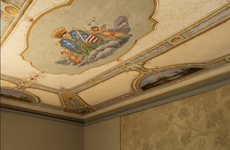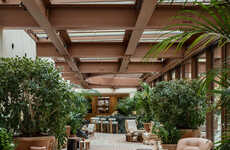
Castello Di Ugento is a Nine-Room Hotel That Formerly Housed Italian Royalty
Madison Mackay — June 26, 2018 — Art & Design
References: castellodiugento & uncrate
Situated on a hillside overlooking a beautiful town in Italy, the Castello Di Ugento is an ancient castle that was renovated to be a luxurious travel option.
Formerly housing an Italian royal family, the hotel is now a nine-room boutique space that has a historic shell with a repurposed interior with luxe guest rooms, an art museum and a culinary school. The five-star accommodation seamlessly blends the structure's regal heritage with a unique modern design. Each room was designed differently with a mix of contemporary furnishings, handmade Italian textiles and local antique pieces. The in-house restaurant offers local fare and uses only fresh produce that was grown in the property's garden.
Filled with unique amenities, the Castello Di Ugento offers guided tours through more than 100 medicinal and aromatic local plants on site.
Formerly housing an Italian royal family, the hotel is now a nine-room boutique space that has a historic shell with a repurposed interior with luxe guest rooms, an art museum and a culinary school. The five-star accommodation seamlessly blends the structure's regal heritage with a unique modern design. Each room was designed differently with a mix of contemporary furnishings, handmade Italian textiles and local antique pieces. The in-house restaurant offers local fare and uses only fresh produce that was grown in the property's garden.
Filled with unique amenities, the Castello Di Ugento offers guided tours through more than 100 medicinal and aromatic local plants on site.
Trend Themes
1. Luxury Boutique Hotels - Disruptive innovation opportunities include incorporating unique amenities and differentiated experiences to attract discerning luxury travelers.
2. Historic Repurposing - Disruptive innovation opportunities include transforming historical buildings into unique, luxury boutique hotels that blend heritage with modern design.
3. Sustainable Culinary Tourism - Disruptive innovation opportunities include integrating sustainable practices and farm-to-table experiences to appeal to eco-conscious travelers.
Industry Implications
1. Hospitality - Disruptive innovation opportunities include reimagining traditional hotel concepts to create exclusive and personalized experiences.
2. Historical Restoration - Disruptive innovation opportunities include repurposing historical landmarks for tourism, offering visitors a glimpse into the past with modern amenities.
3. Culinary Education - Disruptive innovation opportunities include incorporating culinary schools into boutique hotels to provide guests with unique culinary experiences and educational opportunities.
2.8
Score
Popularity
Activity
Freshness























